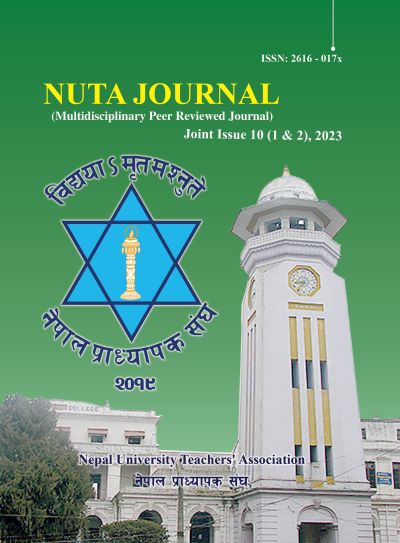माध्यमिक तहको नेपाली भाषा पाठ्यक्रम कार्यान्वयनको प्रभावकारिता {Effectiveness of Nepali Language Curriculum Implementation at Secondary Level}
DOI:
https://doi.org/10.3126/nutaj.v10i1-2.63052Keywords:
मुल्याङ्कन, विद्यार्थी क्रियाकलाप, शिक्षक क्रियाकलाप, शिक्षक व्यवस्थापन, शैक्षिक सामाग्री, (Evalution), student activity, teacher activity, teacher management, educational materialsAbstract
माध्यमिक नेपाली भाषा पाठ्यक्रम कार्यान्वयनको प्रभावकारिता शीर्षक शिक्षक तालिम, पाठ्यक्रमको उपलब्धता, शैक्षणिकयोजना निर्माण र प्रयोगको अवस्थाको पहिचान र कार्यान्वयनको प्रभावकारितासँग सम्बद्ध रहेको छ । यसमा सूचनाका रूपमा काठमाडौँ जिल्लाभित्रका ४ ओटा सामुदायिक विद्यालयका नेपाली भाषा शिक्षकहरू रहेका छन् । अध्ययनका क्रममा प्रश्नावली फाराम र कथात्मक सोधनीमार्फत् डायरी टिपोटको आधारमा अभिलेख निर्माण गरी प्राथमिक स्रोतबाट सूचनाहरू सङ्कलन गरिएको छ । साथै सैद्धान्तिक पक्षलाई निरूपण गर्न पाठ्यक्रम, पाठ्यपुस्तक जस्ता द्वितीयक स्रोतबाट पनि सामग्री सङ्कलन गरिएको छ । सङ्कलित सामग्रीलाई वर्णनात्मक विश्लेषण विधिको उपयोग गरिएको छ । अध्ययनमा सबै विद्यालयमा तालिम प्राप्त र नेपाली विषयमा विशिष्टीकरण गरेका शिक्षक, बार्षिक कार्यतालिका निर्माण गर्नुजस्ता कुराहरू सकारात्मक रूपमा रहेको पाइन्छ तर पनि सम्बन्धित सरोकारवालाहरूले आफ्नो भूमिका निर्वाह गर्न चुकेका, विद्यालय तथा शिक्षकले भाषा पाठ्यक्रमले तोकेका शैक्षिक सामग्री तथा स्रोत परिचालन गरी आवश्यक शैक्षणिक सुविधाहरू तथा सिपगत कुशलता वृद्धि र परिचालनमा अपेक्षित गति लिन नसकेका कमजोरी देखियो । साथै अनुगमन तथा मूल्याङ्कन प्रक्रिया फितलो हुनु, भाषा पाठ्यक्रमको विषयसम्बद्ध अन्य सामग्रीहरू प्रयोग नहुनुजस्ता समस्याले पाठ्यक्रमको प्रभावकारी कार्यान्वयनमा व्यवधान खडा गरेको देखियो । भाषा पाठ्यक्रम कार्यान्वयनका सन्दर्भमा शिक्षकले पाठमा दिइएका अभ्यास मात्र गराई अन्य सिर्जनात्मक अभ्यास कमै गराउने गरिएको पाइयो । यसका लागि पाठ्यक्रमले तोकेका शैक्षिक सामग्री पर्याप्त मात्रामा उपलब्ध गराई अनुगमन प्रक्रियालाई चुस्त दुरुस्त बनाउने हो भने पाठ्यक्रम कार्यान्वयन र पठनपाठनमा देखापरेका समस्याहरू केही हदसम्म निराकरण गर्न सकिने प्रकृतिका रहेको निष्कर्ष निकालिएको छ । {he effectiveness of secondary Nepali language curriculum implementation is related to the effectiveness of teacher training, availability of curriculum, pedagogical plan creation and use situation identification and implementation effectiveness. For your information, there are Nepali language teachers from 4 community schools in Kathmandu district. During the study, information has been collected from primary sources by creating records based on diary notes through questionnaire forms and narrative inquiries. In addition, material has been collected from secondary sources such as curriculum and textbooks to represent the theoretical aspect. Descriptive analysis method has been used for the collected material. n the study, it is found that there are positive things such as teachers who are trained and specialized in Nepali subjects, creating an annual schedule, but the relevant stakeholders have failed to fulfill their roles, the schools and teachers have mobilized the educational materials and resources prescribed by the language curriculum, and the necessary educational facilities and increased teaching skills. And the weakness of not being able to take the expected speed in the operation was seen. In addition, it was seen that problems such as slowness of monitoring and evaluation process, non-use of other materials related to the subject of the language course created disruptions in the effective implementation of the course. Regarding the implementation of the language curriculum, it was found that the teacher did only the exercises given in the lesson and rarely did other creative exercises. For this purpose, it has been concluded that if the educational materials prescribed by the curriculum are made available in sufficient quantity and the monitoring process is made agile, then the problems that have appeared in the implementation and teaching of the curriculum can be resolved to some extent.}
Downloads
Downloads
Published
How to Cite
Issue
Section
License
© Copyright by NUTA JOURNAL
All Rights Reserved. No part of this Journal may be reproduced in any form or by any electronic or mechanical means, including information storage and retrieval system without prior permission in writing from the publisher, except by a reviewer who may quote brief extracts while reviewing.

